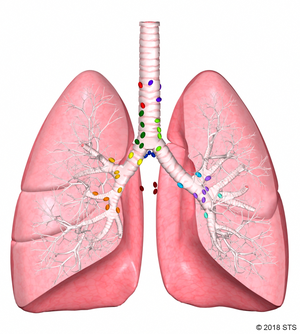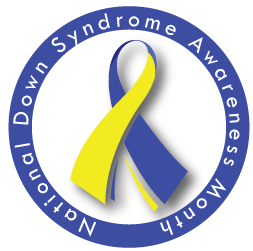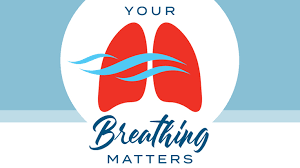- Adult Heart DiseaseDiseases of the arteries, valves, and aorta, as well as cardiac rhythm disturbances
- Pediatric and Congenital Heart DiseaseHeart abnormalities that are present at birth in children, as well as in adults
- Lung, Esophageal, and Other Chest DiseasesDiseases of the lung, esophagus, and chest wall
- ProceduresCommon surgical procedures of the heart, lungs, and esophagus
- Before, During, and After SurgeryHow to prepare for and recover from your surgery
October is Healthy Lung Month—a time to raise awareness about lung disease, the importance of protecting the lungs, and possible ways of avoiding lung health issues.
The lungs are responsible for getting oxygen into the bloodstream where it’s then carried to the cells, tissues, and organs in the body. Breathing about 25,000 times and inhaling approximately 2,400 gallons of air every day, the lungs are the only internal organ in constant contact with the environment outside the body.

The air that we breathe is mostly oxygen and nitrogen, with small amounts of other gases, floating bacteria, and viruses. It also contains the products of tobacco smoke, automobile exhaust, and other pollutants from the atmosphere, making the lungs vulnerable to a number of diseases.
Lung disease refers to many conditions including lung cancer, chronic obstructive pulmonary disease (COPD), pulmonary fibrosis, chronic bronchitis, emphysema, interstitial lung disease, asthma, and infections such as influenza, pneumonia, and tuberculosis.
According to the American Lung Association (ALA):
- Lung cancer is the leading cancer killer in the US and worldwide, causing more deaths than colorectal, breast, and prostate cancers combined.
- COPD is the third leading cause of death in the US with more than 11 million diagnosed and an estimated 24 million undiagnosed.
- Women are more vulnerable to lung damage from cigarette smoke and other pollutants.
- 85 to 90% of COPD cases are caused by smoking, but nonsmokers can get COPD too.
- Pulmonary fibrosis causes scarring in the lungs.
- Around 140,000 Americans have been diagnosed with pulmonary fibrosis.
Common symptoms of lung disease include:
- Chronic cough that lasts for at least one month.
- Chronic mucus production that lasts for at least one month.
- Chronic chest pain, especially if caused by breathing and/or coughing.
- Coughing up blood can be a red flag indicating lung problems.
- Shortness of breath or labored breathing even without physical exertion.
- Wheezing could be a sign that the airways are narrow or there is something blocking them.
Here are a few tips to help you care for your lungs:
- Stop smoking: Smoking causes chronic inflammation, and may cause changes that can lead to lung cancer.
- Be mindful of air pollution: Have your home tested for radon, and avoid staying in places that have polluted air.
- Exercise: Daily aerobic exercise and breathing exercises are ways you can “work out” your lungs to their full capacity.
- Get checked regularly: Seek medical help on a regular basis to address any medical concerns or questions you might have.
For more information about healthy lungs, visit the American Lung Association.
What is the latest with vaping-related illnesses and deaths?
Check out the “Lung Illnesses Associated with Use of Vaping Products” webpage from the US Food and Drug Administration (FDA). You’ll find an overview of the incidents, information on what the FDA has done so far, and recommendations for consumers and health care providers.

Down Syndrome Awareness Month offers the opportunity to spread awareness of Down syndrome as well as to celebrate the abilities and accomplishments of people with Down syndrome.
According to the National Down Syndrome Society (NDSS), one in every 691 babies in the US is born with Down syndrome, making Down syndrome the most common genetic condition. Approximately 400,000 Americans have Down syndrome and about 6,000 babies with Down syndrome are born in the US each year. Down syndrome occurs in people of all races and economic levels.

The NDSS reports that approximately half of all infants born with Down syndrome have a congenital heart defect. The most common defects are atrioventricular septal/canal defect, ventricular septal defect, and tetralogy of fallot.
Children with Down syndrome who have major heart defects may experience heart failure, difficulty breathing, and failure to thrive as a newborn, according to the NDSS. In other children, the defect may not be apparent, so it is important that all children with Down syndrome have an echocardiogram in the first few months of life. Prenatal ultrasounds may also help identify some heart conditions.
Heart surgery will likely be recommended, and allows many children with Down syndrome and heart conditions to thrive and lead healthy, productive lives.

The American Association for Respiratory Care (AARC) recognizes Respiratory Care Week from October 24-30, in an effort to celebrate the respiratory care profession and to raise awareness for improving lung health around the world.
Respiratory Therapists (RTs) are licensed health care professionals who assist physicians by providing diagnostic, treatment, and management services to patients with respiratory diseases. Some of the jobs that the 110,000 RTs practicing in the US perform on a daily basis include:
- Support patients with asthma, emphysema, and other lung conditions.
- Maintain respiratory equipment including ventilators.
- Assist in emergencies such as heart failure, heart attack, stroke, and shock.
- Teach patients breathing exercises.
Experts recommend the following tips for healthy respiratory and lung health:
- Avoid smoking.
- Maintain a healthy weight.
- Eat a balanced diet.
- Stay hydrated.
- Reduce alcohol intake.
- Practice good hygiene.
- Be active and exercise.
- Learn yoga breathing techniques.
- Limit exposure to chemicals and common allergens.
- Protect yourself against outdoor pollution.
- Check for radon in your home.
- Know the warning signs of lung disease.*
*Some of the warning signs of lung disease are:
- Chronic cough that lasts for at least one month.
- Chronic mucus production that lasts for at least one month.
- Chronic chest pain, especially if caused by breathing and/or coughing.
- Coughing up blood can be a red flag indicating lung problems.
- Shortness of breath or labored breathing even without physical exertion.
- Wheezing could be a sign that the airways are narrow or there is something blocking them.
Lung Health Day
Lung Health Day (October 27)—the Wednesday of Respiratory Care Week—gives extra special attention to one of the most important organs in the body, while also promoting good lung health and building awareness of conditions and diseases that affect the lungs.

